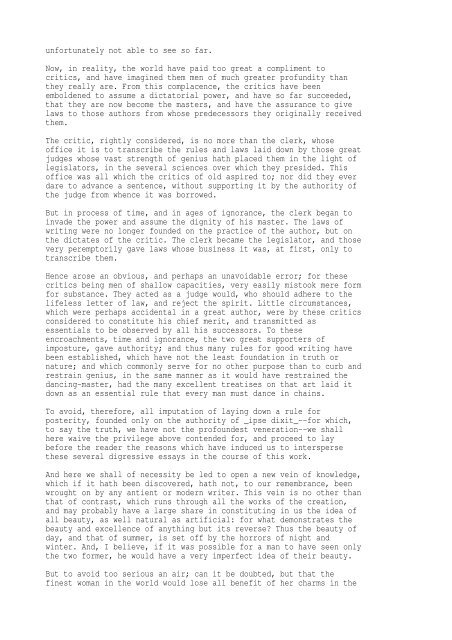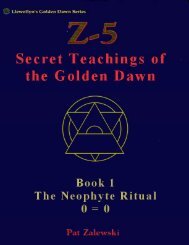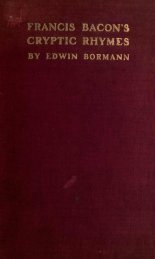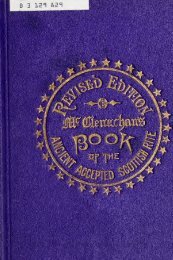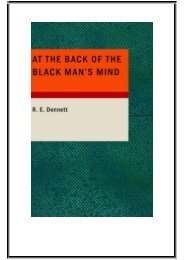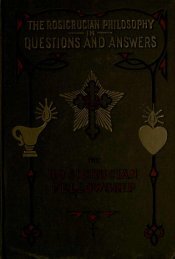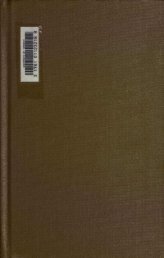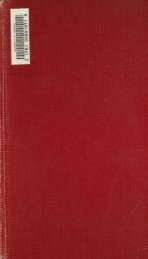- Page 5:
BOOK VI -- CONTAINING ABOUT THREE W
- Page 10 and 11:
Chapter i -- An essay to prove that
- Page 12 and 13:
Chapter vii -- Continuation of the
- Page 14 and 15:
virtue, nothing inconsistent with t
- Page 16 and 17:
this dish is too common and vulgar;
- Page 18 and 19:
Chapter iii.An odd accident which b
- Page 20 and 21:
Allworthy here betook himself to th
- Page 22 and 23:
scarecrows.The next step was to exa
- Page 24 and 25:
On her arrival in this place, she w
- Page 26 and 27:
to her as follows: "You know, child
- Page 28 and 29:
is an instance of your opinion of m
- Page 30 and 31:
must own I cannot help admiring the
- Page 32 and 33:
The hospitality of Allworthy; with
- Page 34 and 35:
It seemed, therefore, not unlikely
- Page 36 and 37:
To deal plainly with the reader, th
- Page 38 and 39:
in immense wealth. I might, perhaps
- Page 40 and 41:
unaccountable ingratitude in the ca
- Page 42 and 43:
Which nation rise the glorious lord
- Page 44 and 45:
Chapter iii.The description of a do
- Page 46 and 47:
To make a life of jealousyAnd follo
- Page 48 and 49:
parish in England.Mrs Partridge bei
- Page 50 and 51:
Containing much matter to exercise
- Page 52 and 53:
"But though," continued he, "there
- Page 54 and 55:
confirmation of the schoolmaster's
- Page 56 and 57:
things, been the occasion of depriv
- Page 58 and 59:
topic of conversation between them.
- Page 60 and 61:
prevented him from discovering to t
- Page 62 and 63:
dissuaded her from indulging; attem
- Page 64 and 65:
company; being altered only from wh
- Page 66 and 67:
Chapter ii.The heroe of this great
- Page 68 and 69:
him, denounced great vengeance, swe
- Page 70 and 71: profest Platonist, and in religion
- Page 72 and 73: Indeed, I doubt not but this ridicu
- Page 74 and 75: something which at first sight appe
- Page 76 and 77: epresented in parliament.Thwackum,
- Page 78 and 79: correcting the ladies in Bridewell.
- Page 80 and 81: I ask pardon for this short appeara
- Page 82 and 83: of in the same manner. This Bible M
- Page 84 and 85: sportsmen.The higgler to whom the h
- Page 86 and 87: must overpower every reader; for no
- Page 88 and 89: Yet is it possible, my friend, that
- Page 90 and 91: However, as persons who suspect the
- Page 92 and 93: "Drink about," says Western. "Pox o
- Page 94 and 95: a truly benevolent disposition, men
- Page 96 and 97: Sophia, as soon as she could speak
- Page 98 and 99: integrity which nothing can corrupt
- Page 100 and 101: former of these created gratitude,
- Page 102 and 103: up to Molly than they pelted her wi
- Page 104 and 105: then flying at the mob, who were al
- Page 106 and 107: often essayed, and which the word v
- Page 108 and 109: Ay, ay, as sure as two-pence, Tom i
- Page 110 and 111: acts are daily committed by magistr
- Page 112 and 113: in the tenderest part, by giving a
- Page 114 and 115: we have so profound a respect, will
- Page 116 and 117: overjoyed to find her unhurt, cried
- Page 118 and 119: as soon as it was over, and asked b
- Page 122 and 123: eye of a man who had never seen one
- Page 124 and 125: from one so abandoned in his youth,
- Page 126 and 127: pure and firm than his, might have
- Page 128 and 129: ut this was perfectly indiscriminat
- Page 130 and 131: perplexed the mind of the worthy yo
- Page 132 and 133: London, who are not suffering but d
- Page 134 and 135: expose thee? I promise thee, I was
- Page 136 and 137: ecame not only melancholy when alon
- Page 138 and 139: saying? Pardon me if I have said to
- Page 140 and 141: protracted of such enjoyments! how
- Page 142 and 143: Besides grief for her master, there
- Page 144 and 145: It was now debated whether Mr Allwo
- Page 146 and 147: many bumpers to the doctor's health
- Page 148 and 149: though there is much of dignity and
- Page 150 and 151: the reason of them. To which Blifil
- Page 152 and 153: Our heroe received the enemy's atta
- Page 154 and 155: This tragical scene was now convert
- Page 156 and 157: Of love.In our last book we have be
- Page 158 and 159: Chapter ii.The character of Mrs Wes
- Page 160 and 161: other; and it signifies nothing wha
- Page 162 and 163: her manner. Secondly, she addressed
- Page 164 and 165: of pleasure. I answer, They were no
- Page 166 and 167: the good lady could not forbear ask
- Page 168 and 169: ecollected herself, said, "That on
- Page 170 and 171:
me go and see, only for a fancy, wh
- Page 172 and 173:
Mr Western took care to way-lay the
- Page 174 and 175:
like me. Do not unkindly withhold t
- Page 176 and 177:
few minutes began to recover, and a
- Page 178 and 179:
varden. I always thought what would
- Page 180 and 181:
Thwackum was now sent for, and pres
- Page 182 and 183:
clothes and everything else should
- Page 184 and 185:
promised to do. And indeed I believ
- Page 186 and 187:
much at my last prayers as to suffe
- Page 188 and 189:
our corn, and left us nothing but t
- Page 190 and 191:
well convinced, with their usual vo
- Page 192 and 193:
wrath of her father, and to what pu
- Page 194 and 195:
e, my brother is resolved; nay, sin
- Page 196 and 197:
was silly, which is generally under
- Page 198 and 199:
ingratitude as well as impiety to t
- Page 200 and 201:
These matters were resolved on, whe
- Page 202 and 203:
mattered not how wicked were the me
- Page 204 and 205:
e sure, his ghost hath walked there
- Page 206 and 207:
sacrificing Sophia and all her secr
- Page 208 and 209:
Chapter ix.The wise demeanour of Mr
- Page 210 and 211:
Instances of this behaviour in pare
- Page 212 and 213:
Though Jones was very unfit for any
- Page 214 and 215:
through it.Chapter xi.The adventure
- Page 216 and 217:
dexterity, so well ingratiated hims
- Page 218 and 219:
And there's Corderius, another d--n
- Page 220 and 221:
Such an ascendant had our lieutenan
- Page 222 and 223:
"Indeed, madam," said the lieutenan
- Page 224 and 225:
soreness on that side of his head."
- Page 226 and 227:
Jones was in a very dangerous condi
- Page 228 and 229:
which he entered, and where the cen
- Page 230 and 231:
contrive the quomodo, which appeare
- Page 232 and 233:
BOOK VIII.CONTAINING ABOUT TWO DAYS
- Page 234 and 235:
story of the ghost of George Villie
- Page 236 and 237:
error here hinted at; their heroes
- Page 238 and 239:
to the contrary, for she hath menti
- Page 240 and 241:
always to let one another know such
- Page 242 and 243:
est-natured gentlemen in the univer
- Page 244 and 245:
was extremely open-hearted, very re
- Page 246 and 247:
came you not to inform me of this l
- Page 248 and 249:
Chapter vii.Containing better reaso
- Page 250 and 251:
might have been expected, from the
- Page 252 and 253:
and once, when Squire Allworthy was
- Page 254 and 255:
told Partridge the story from the S
- Page 256 and 257:
efore, Partridge was in truth a Jac
- Page 258 and 259:
travellers who had lost their way,
- Page 260 and 261:
cried out, "You will pardon me, you
- Page 262 and 263:
in the next chapter.Chapter xi.In w
- Page 264 and 265:
necessary for preparing for my appr
- Page 266 and 267:
"Here I first began seriously to re
- Page 268 and 269:
"I had now regained my liberty," sa
- Page 270 and 271:
pocket. To say the truth, I doubted
- Page 272 and 273:
and for two years I continued of th
- Page 274 and 275:
against the capricious invasions of
- Page 276 and 277:
friend Mr Watson! Here I will not t
- Page 278 and 279:
"Events of this nature in the publi
- Page 280 and 281:
and ungenerous. I could not look on
- Page 282 and 283:
of detestation and scorn."As for my
- Page 284 and 285:
"Alas! young man," answered the str
- Page 286 and 287:
pens, and ink, with the manual capa
- Page 288 and 289:
plainness, honesty, and sincerity;
- Page 290 and 291:
direct them; indeed, he wondered at
- Page 292 and 293:
is universally believed in those co
- Page 294 and 295:
Jones, his female companion, and Pa
- Page 296 and 297:
I am heartily sorry your ladyship h
- Page 298 and 299:
entirely satisfied that appetite wh
- Page 300 and 301:
"This smile our heroe received full
- Page 302 and 303:
was publickly known that there was
- Page 304 and 305:
serjeant said, there were some doub
- Page 306 and 307:
to lay on his conscience.And here,
- Page 308 and 309:
Chapter ii.Containing the arrival o
- Page 310 and 311:
of her?"Fitzpatrick, now perceiving
- Page 312 and 313:
etter supper ordered this half-year
- Page 314 and 315:
little sack whey, made very small a
- Page 316 and 317:
saying, "Good woman, I must insist
- Page 318 and 319:
"but _non omnia possumus omnes_. On
- Page 320 and 321:
perfectly easy, continued her journ
- Page 322 and 323:
pleased with returning to his frien
- Page 324 and 325:
looks of Mr Western; who no sooner
- Page 326 and 327:
charming Sophia.Early in the mornin
- Page 328 and 329:
from the too inordinate fondness of
- Page 330 and 331:
Sophia, finding all her persuasions
- Page 332 and 333:
hatred to Blifil, her compassion, a
- Page 334 and 335:
the means by which they are effecte
- Page 336 and 337:
The adventures which Sophia met wit
- Page 338 and 339:
ye-standers. This made her suspect
- Page 340 and 341:
eheaded." "Pooh!" answered the husb
- Page 342 and 343:
"It is natural to the unhappy to fe
- Page 344 and 345:
strongly verified by my aunt, that,
- Page 346 and 347:
money. Pray, sir, take a fool's adv
- Page 348 and 349:
drinking consumed so much of his ti
- Page 350 and 351:
dreadful catastrophe, lies fast asl
- Page 352 and 353:
"At length my friend was removed fr
- Page 354 and 355:
come, with all the embellishments w
- Page 356 and 357:
plaice sound and firm, the flounder
- Page 358 and 359:
commemorated, had seen the attendan
- Page 360 and 361:
master; it being the nature of guts
- Page 362 and 363:
offspring of wealth and dulness. On
- Page 364 and 365:
choose to be her guardian as a pers
- Page 366 and 367:
Now, to obviate all such imputation
- Page 368 and 369:
What are we to understand by this?
- Page 370 and 371:
Sophia is flown? Cruel Sophia! Crue
- Page 372 and 373:
not I; as to matter of that. I know
- Page 374 and 375:
who more than once shook his head,
- Page 376 and 377:
e able to engage this whole army yo
- Page 378 and 379:
a situation not very proper to be d
- Page 380 and 381:
willingly be thought the attendant
- Page 382 and 383:
"Pogh!" cries the clerk, with great
- Page 384 and 385:
the lady of her fine riding-habit,
- Page 386 and 387:
almost everything which had happene
- Page 388 and 389:
for Jones, notwithstanding his hurr
- Page 390 and 391:
Jones, as the reader knows, was yet
- Page 392 and 393:
cloaths, and other refreshments, to
- Page 394 and 395:
will be in; to be sure it is always
- Page 396 and 397:
"Me have honour, as me say, to be d
- Page 398 and 399:
[*] Nerva, Trajan, Adrian, and the
- Page 400 and 401:
While this was preparing, Partridge
- Page 402 and 403:
shoulder of mutton, that at this in
- Page 404 and 405:
Our travellers having remounted the
- Page 406 and 407:
all between thy Allen and thy Lyttl
- Page 408 and 409:
not take an answer."I have often th
- Page 410 and 411:
here put an end to this chapter.Cha
- Page 412 and 413:
Upon my word, madam," says she, "it
- Page 414 and 415:
The next morning, as early as it wa
- Page 416 and 417:
whole theory and practice of that t
- Page 418 and 419:
This compliment was so apparently d
- Page 420 and 421:
To confess the truth, Mr Jones was
- Page 422 and 423:
talk any longer with that trollop,
- Page 424 and 425:
into my doors at this time of night
- Page 426 and 427:
with her tears, beg her to be comfo
- Page 428 and 429:
despair of rendering agreeable to t
- Page 430 and 431:
The hurry of spirits into which thi
- Page 432 and 433:
as he knew Mrs Miller to be extreme
- Page 434 and 435:
duty to her father forbid her to fo
- Page 436 and 437:
satisfaction, and no less to that o
- Page 438 and 439:
practice of deceit; upon which, whe
- Page 440 and 441:
who are, indeed, so entirely made u
- Page 442 and 443:
ascal your servant would scarce let
- Page 444 and 445:
This letter administered the same k
- Page 446 and 447:
told you a confounded lie: and I be
- Page 448 and 449:
"I heartily wish you had," cries Jo
- Page 450 and 451:
person to wait on you, and to pay y
- Page 452 and 453:
utality, commonly called jests, on
- Page 454 and 455:
to Jones, and began to renew her ap
- Page 456 and 457:
shadow.--But I am well assured ther
- Page 458 and 459:
sometimes of those of the public. H
- Page 460 and 461:
While the father stood like one str
- Page 462 and 463:
without any ceremony into the compa
- Page 464 and 465:
A short chapter, which concludes th
- Page 466 and 467:
immortality.But as the reader's cur
- Page 468 and 469:
immediately entered the lists with
- Page 470 and 471:
a Somersetshire lad just came to to
- Page 472 and 473:
must send to Lady Edgely for one of
- Page 474 and 475:
live, nor will I live without you."
- Page 476 and 477:
"Pugh!" said the squire, "what sign
- Page 478 and 479:
I have little reason to hope it wil
- Page 480 and 481:
indeed, brother, you are not a fit
- Page 482 and 483:
stop till Partridge came running in
- Page 484 and 485:
on such occasions, calmly replied:
- Page 486 and 487:
her family brought to a happy concl
- Page 488 and 489:
"Honourable!" answered Jones; "no b
- Page 490 and 491:
mind. There was in this scheme too
- Page 492 and 493:
not determine. But that it might be
- Page 494 and 495:
Bellaston, not above five guineas r
- Page 496 and 497:
friend, and wished Mr Blifil at the
- Page 498 and 499:
not only law books, and good books,
- Page 500 and 501:
satisfaction. His lordship would ha
- Page 502 and 503:
a poor bastardly vagabond." "If it
- Page 504 and 505:
passage into the fowl.Sophia, notwi
- Page 506 and 507:
the other, that I question whether
- Page 508 and 509:
long, unintelligible story about hi
- Page 510 and 511:
Miller, and her younger daughter, i
- Page 512 and 513:
man, on any account.--He seemed fri
- Page 514 and 515:
a young lady was even an act of cha
- Page 516 and 517:
e in a better humour in the afterno
- Page 518 and 519:
masterpiece of assurance. With your
- Page 520 and 521:
they are not punishable by law. I h
- Page 522 and 523:
after set forward to London.The rea
- Page 524 and 525:
have pitied him. But, bad as it is,
- Page 526 and 527:
called him fellow.--Indeed, my best
- Page 528 and 529:
astard of somebody's, I don't know
- Page 530 and 531:
if they could avoid this, good heav
- Page 532 and 533:
The reader may pretty well guess Bl
- Page 534 and 535:
dishonourable design; it is impossi
- Page 536 and 537:
have heard more than you know. Matt
- Page 538 and 539:
paleness; but she now waxed redder,
- Page 540 and 541:
friendship to this man to a blameab
- Page 542 and 543:
a most cruel persecution: nay, it i
- Page 544 and 545:
warmly protesting against his lords
- Page 546 and 547:
not shock you; but you know, I beli
- Page 548 and 549:
ignorant, as the adventure of the m
- Page 550 and 551:
"I hope, sir," said Partridge, "you
- Page 552 and 553:
My Sophia! how dares such a wretch
- Page 554 and 555:
The reader may suppose Mrs Miller r
- Page 556 and 557:
"I have somewhere read, that the gr
- Page 558 and 559:
epent, as in the case of those who
- Page 560 and 561:
entirely free. I know I have been g
- Page 562 and 563:
yet there is one above who knows th
- Page 564 and 565:
with you; and it is such as I can i
- Page 566 and 567:
orn, in the presence only of myself
- Page 568 and 569:
squire, "take a fool's advice; neve
- Page 570 and 571:
was not proper you should appear in
- Page 572 and 573:
desired to know when he would be pl
- Page 574 and 575:
he should not behave well to such a
- Page 576 and 577:
my cousin my Lady Bellaston's. He h
- Page 578 and 579:
so miserable to have incurred her d
- Page 580 and 581:
vagabond into the sea-service, when
- Page 582 and 583:
deprived of any means or time for r
- Page 584 and 585:
extremely beautiful, that even Allw
- Page 586 and 587:
you.--Yet permit me at least once m
- Page 588 and 589:
daughter and her husband were, than
- Page 590 and 591:
emains of her fortune. She lives in


